
Google is applying AI to predict the likelihood of a heart attack or stroke. Google, which is presenting its findings Monday in Nature Biomedical Engineering, says that such a method is as accurate as predicting cardiovascular disease through more invasive measures.
At the same time, Google cautions that more research needs to be done. According to the company, medical researchers have previously shown some correlation between retinal vessels and the risk of a major cardiovascular episode. Using the retinal image, Google says it was able to quantify this association and 70% of the time accurately predict which patient within five years would experience a heart attack or other major cardiovascular event, and which patient would not. Those results were in line with testing methods that require blood be drawn to measure a patient’s cholesterol.
Google used models based on data from 284,335 patients and validated on two independent data sets of 12,026 and 999 patients.
"The caveat to this is that it’s early (and) we trained this on a small data set," says Google’s Lily Peng, an MD and lead researcher on the project. "We think that the accuracy of this prediction will go up a little bit more as we kind of get more comprehensive data. Discovering that we could do this is a good first step. But we need to validate."
Peng says Google was a bit surprised by the results. Her team had been working on predicting eye disease, then expanded the exercise by asking the model to predict from the image whether the person was a smoker or what their blood pressure was. Taking it further to predicting the factors that put a person at risk of a heart attack or stroke was an offshoot of the original research.
Google’s technique generated a "heatmap" or graphical representation of data which revealed which pixels in an image were the most important for a predicting a specific risk factor. For example, Google’s algorithm paid more attention to blood vessels for making predictions about blood pressure.
Should further research pan out over time, physicians, as part of your routine health check-ups, might study such retinal images to help assess and manage patients’ health risks.
How long might it take? Peng says it is more in the "order of years" than something that will happen over the next few months. "It’s not just when it’s going to be used, but how it’s going to be used," she says.
